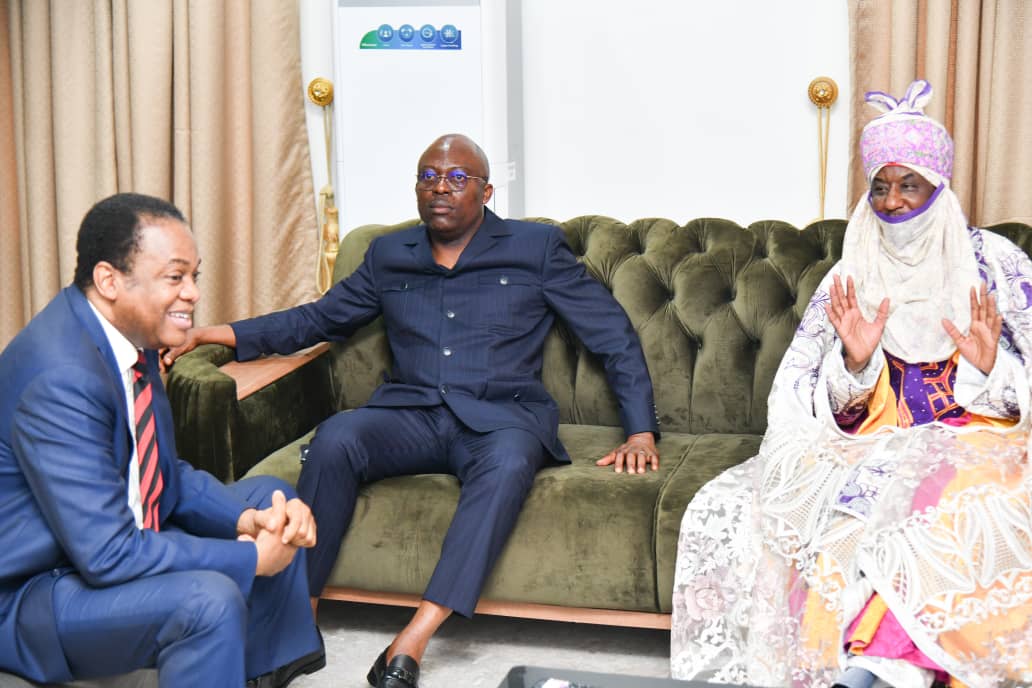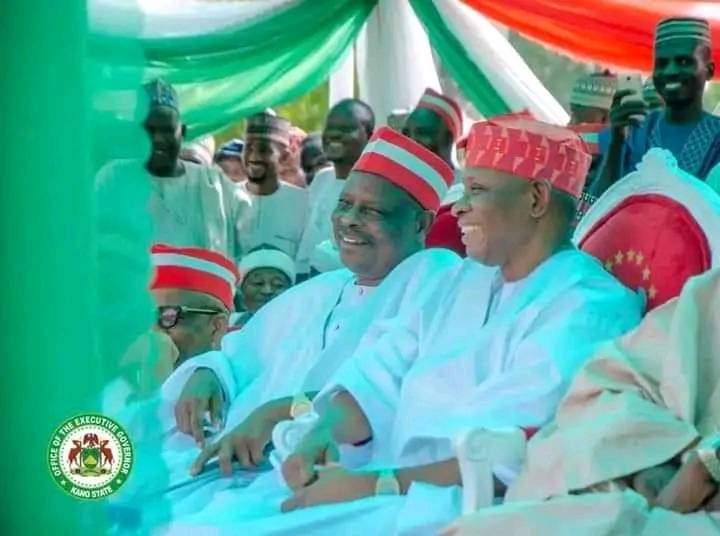
• Sanusi may lead Jumat prayer today at Kano Central Mosque
• Northern elders fault govt decision to abolish five emirates
• Ganduje keeps mum, cancels trip to Kano
• Governor Yusuf breached agreement with Kano elites, says Saidu
Four years after he was deposed as the 14th Emir of Kano and banished to Nasarawa State, Mother Luck, yesterday smiled on Muhammad Lamido Sanusi, as the state governor, Abba Kabir Yusuf, reinstated him to the office.
The development followed the signing of the Kano State Emirate Council (Repeal) Bill 2024 by the governor. The bill was passed by the State House of Assembly on Thursday morning.
The new law also abolished the five emirates established by the administration of the immediate past governor of the state and national chairman of the All Progressives Congress (APC), Dr Abdullahi Umar Ganduje.
With the development, the 15th Emir of Kano Aminu Ado Bayero, Emir of Bichi Nasir Ado Bayero, Emir of Rano Kabiru Muhammad Inuwa, Emir of Karaye Ibrahim Abubakar II and Emir of Gaya Aliyu Ibrahim Abdulkadir have been sacked.
The development, however, heightened tension in the Kano metropolis and its environs over the eventual fate of the already-established Emirates and their teeming supporters.
Findings showed that some of the deposed Emirs and their loyalists carried on unbothered yesterday afternoon. Another report had it that Aminu Ado Bayero might have vacated the palace shortly after the bill was passed into law.
Governor Yusuf had issued a 48-hour ultimatum to Aminu Ado Bayero and four other former first-class chiefs to vacate the palace and hand over all emirates’ property to the office of the Deputy Governor.
Yusuf, who signed the bill into law in the presence of the Deputy Governor, Aminu Abdulsalam, the Speaker of Kano State House of Assembly, Ismail Falgore, and other top government functionaries, said, the new law will bring unity to the people of Kano and foster sustainable socio-economic development.
He said that the return of Muhammad Sanusi II back on the throne would propel peace and prosperity, adding that the repeal of the council law was in realisation of his campaign commitments to restore the lost glory of the state and its rich cultural heritage and restoration of the revered legacy of the Kano emirate, which has “withstood the test of time of over a thousand years. ”
In a statement issued by the Governor’s Spokesperson, Mr Sanusi Bature Dawakin Tofa, he said, “I want to inform the good people of Kano that today, we re-appointed Sanusi Lamido Aminu Sanusi popularly known as Muhammadu Sanusi II as the 16th Emir of Kano while the five former emirs are expected to vacate the palaces within 48 hours.”
The former Governor of the Central Bank of Nigeria (CBN), who was suspended in February 2014 by the President Goodluck Jonathan administration from the apex bank for alleging that $20 billion in oil revenue had gone missing was installed Emir of Kano on June 8, 2014.
The renowned economist and social critic turned traditional ruler was sacked on March 9, 2020.
The former Kano governor said he was removed “to safeguard the sanctity, culture, tradition, religion and prestige of the Kano emirate”, accusing the emir of “total disrespect” of institutions and the governor’s office.
With the development, Sanusi who was delivering a keynote address at the Economic Summit organised by the Rivers State Government in Port Harcourt when the emirate law was repealed hurriedly left, amid tight security, to the airport.
Sanusi arrived at the Obi Wali International Conference Centre, Port Harcourt about 11.30 am yesterday in the full trappings of the Kano Emirate accompanied by assistants.
His presentation was sharp and straightforward, lasting for about 21 minutes. The presentation, which was strictly read as prepared, was devoid of the usual drama for which he is known.

On and out of the podium, Sanusi was shielded with the symbolic umbrella and accompanied by officials of the Emirate.
Sanusi left the hall with his host, Governor Sim Fubara, and his entourage immediately after the presentation. He flew to Kano in a Rivers State Government jet.
On Wednesday, he attended the MTN Nigeria board meeting in Lagos, from where he flew to Port Harcourt, according to information available to The Guardian.
It was also gathered that he almost cancelled the trip to Rivers State, where he spent about an hour, but because he had given the governor his word that he would grace the event to speak.
It was gathered that the reinstated Emir will today lead prayers at the Jumat Service at Kano Central Mosque.
Deputy Speaker of the House, Muhammad Bello Butu, who spoke on the rationale behind the dissolution, said repealing the law that divided the Kano Emirate into five separate entities would help “revive the lost glory of Kano, adding: “The division of Kano Emirate into five reduced the capacity and dignity of the state at the national level.”
Speaking against the cultural implication of the previous division of the emirate council, the Majority Leader, Lawan Hussaini Dala, said: “The emirate council served as a custodian of our culture, which was distorted by the creation of additional emirates. The amendment aims to restore the traditional prestige and unity of the Kano Emirate. With the amendment of the law, all five emirate councils are now abolished. The commissioner for local governments will serve as the overseer.”
The Assembly also adopted a motion to create a new second-class emirate council in the state, signalling a restructuring of the traditional institutions to better align with the state’s cultural and administrative goals.
The reinstatement of Sanusi was seen as a fulfilment of one of the campaign promises of the national leader and presidential candidate of the New Nigerian Peoples Party (NNPP) Rabiu Kwankwaso and Kano State Governor, Abba Kabir Yusuf.

Kwankwaso had announced last year that the law through which Sanusi was removed would be reviewed and he would be returned to the traditional stool.
The Northern Elders Forum (NEF), on Thursday, expressed profound concerns and agitation over the recent events in Kano, where traditional rulers have been dethroned and replaced.
Director of Publicity and Advocacy of the forum, Abdul-Azeez Suleiman, while reacting to the issue, urged the Kano state government and politicians involved to exercise caution in handling this sensitive issue to prevent further escalation of tensions.
He said: “It is important for all parties involved to approach this matter with the utmost care and professionalism, keeping in mind the potential consequences of their actions. Rash decisions and inflammatory statements can only serve to worsen the situation and jeopardize the peace and stability of the state.”
NEF noted that the traditional institution in Nigeria has long been facing challenges and obstacles that have rendered it weak and ineffective, and the problem seems to be particularly acute in Kano.
Meanwhile, the National Chairman of APC, Dr Abdullahi Umar Ganduje, has maintained a studied silence over the decision by the Kano State Government that reinstated Emir Sanusi and abolished the balkanisation of the Kano Emirate.
Ganduje, who was billed to travel to Kano to condole with families of the victims of the Kano Mosque blast in Gezawa local council had to beat a retreat apparently due to the development in his home state.
The former Kano State Governor, who was chauffeur-driven in his official jeep to the party secretariat looked unperturbed as he acknowledged cheers from party faithful while on his way to his office.
He, however, declined comments on the development. His media aides also did not respond to questions from the newsmen.
However, a Kano-based chieftain of the Peoples Democratic Party (PDP), Saidu Bello has criticised Governor Kabir Yusuf for not keeping the agreement he reached with some elites in the state not to tamper with the emirate council.
Yusuf who served as the Special Adviser to the former Governor of Kano State, Ibrahim Shekarau on Public Utilities, expressed the fear that the repeal of the Kano Emirate law could lead to disaffection in the state.
He said, “The return of Emir Sanusi to the throne could create happiness and agony to our people. However, the governor is not acting on his own. He is acting on the orders of his godfather, Kwankwaso.
“Who will bear the consequences because by removing five Emirs, it would remain one. I think it doesn’t make any sense, looking at our socio-cultural development in the state. We shall live to see the reaction from the people.
“What has been speculated all along is that they signed an agreement that they would come back to APC as part of the condition to win at the Supreme Court and must not tamper with the traditional rulers in the country and they should stop the demolition of structures in Kano.”
A Kano-based author, Ado Ibrahim, said the return of Sanusi to the throne was the correct action that was done to reverse the wrong precedence created by Ganduje.
Ibrahim, however, cautioned those who believed Governor Yusuf’s action was executed to satisfy the political interest of his political godfather Kwankwaso to simply settle the score with erstwhile Ganduje.
On the contrary, a Professor of Political Science from Bayero University, Kano, Kamilu Sani Fagge, insisted the repeal of the new emirates established by Ganduje’s administration was a pure act of vendetta.
Fagge was worried that the political gladiators in the state had succeeded in infiltrating the traditional institution to settle their political differences.
He said, “From the law that was passed by the Ganduje administration to the creation of the new five emirs and now to the repeal law that abolished the entire five emirs, it is just about politics. It is all about personal vendetta between the major political giants in Kano struggling to settle scores.
“And this is not likely going to be the end of it, perhaps if another government comes into power, I will not be surprised if the same law is repealed again. Politics is destroying the sacred institution and it is so unfortunate. Our traditional rulers are symbols of our values and tradition, which are supposed to be isolated from politics. Unfortunately, they have been messed up.
Fagge, who clarified that the struggle for the throne should not rest on personality but rather on the age-long institution of the people, urged relevant stakeholders to prevail on the raging crisis to bring about sanity in the emirate.
“Let me say the argument here is not about Sanusi or Aminu. The entire development should go beyond personalities. We should be concerned about the institution regardless of who is the next Emir. Politics in Nigeria has destroyed almost all the sectors including the traditional institution”.



